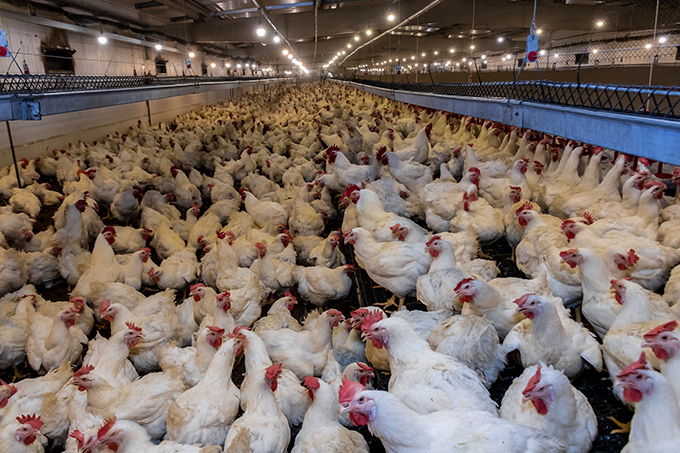Area broiler farm tests positive for avian flu
Published 12:02 pm Tuesday, December 17, 2024

- Poultry. file
A Cullman County broiler farm is one of two Alabama locations where a poultry flock has been culled after one of its chickens has tested positive for a strain of avian flu virus.
In a statement issued Dec. 16, the Alabama Department of Agriculture and Industries (ADAI) and the USDA’s Animal and Plant Health Inspection Service (APHIS) confirmed the presence of highly pathogenic avian influenza (HPAI) in a Cullman County commercial broiler farm, as well as separately in a backyard flock in Pickens County.
In response to the detection of the virus, state officials quarantined the affected premises at the local broiler operation, and culled all birds — approximately 116,000 in Cullman County, and 70 in Pickens County — to prevent the spread of the disease. Additionally, all poultry within a 6.2 miles of the commercial Cullman County site is being tested and monitored further.
Trending
According to the U.S. Centers for Disease Control, HPAI “is considered low risk to human health, but is highly contagious to other birds, including commercial and backyard flocks of poultry,” the state department of agriculture explained. “While the virus is also not considered a food safety threat, infected birds do not enter the food supply” due to culling and quarantine measures.
Flock samples were tested and confirmed positive for HPAI at the Alabama State Diagnostic Laboratory in Auburn.
Speaking with The Times on Dec. 17, local veterinarian Dr. Terry Slaten, who oversees the state agriculture department’s branch diagnostic laboratory at Wallace State Community College in Hanceville, said the culling and quarantine are precautionary steps intended to prevent an escalation of the disease’s spread.
“They’re doing some really extensive testing in the area to make sure that it keeps from spreading,” Slaten said. “In Alabama and especially in Cullman County, poultry is big business. So what they’re doing is just to put the fire out before it spreads.
“If you look over the past two or three years, up in the midwest,” he added, “they’ve had this same virus and it’s hit the table egg people. That’s a big part of why eggs are as expensive as they are now, because, looking at the bigger picture, we’ve lost a lot of the table egg production.”
Poultry represents by far the largest segment of agricultural production in Cullman County. According to a 2022 county profile update in the U.S. Census of Agriculture, Cullman County fielded an overall flock of 15,623,626 birds, in addition to 1.5 million layers and 774,000 pullets. Those numbers greatly exceed that of cattle and calves, the county’s second most productive agricultural animal: Countywide, approximately 45,000 livestock are pastured locally, according to Census figures.
Trending
“It is critical for commercial and backyard poultry operations to remain alert and closely monitor the health of their poultry,” Alabama Agriculture Commissioner Rick Pate and State Veterinarian Dr. Tony Frazier said in their Dec. 16 joint statement. “The detection of HPAI in Cullman and Pickens Counties reinforces the need to continue following strict biosecurity measures, including keeping birds enclosed without access to wild birds or other domestic flocks.”
The Alabama Department of Agriculture and Industries offers the in commercial and backyard flocks:
Sudden increase in bird deaths in your flock
Sneezing, gasping for air, coughing and nasal discharge
Watery and green diarrhea
Lack of energy and poor appetite
Drop in egg production or soft or thin-shelled, misshaped eggs
Swelling of the head, eyelids, comb, wattles and hocks
Purple discoloration of the wattles, comb and legs
Ruffled feathers, listlessness and lethargy
ADAI urges the commercial poultry industry and backyard flock owners to increase biosecurity measures to protect their operations from HPAI. Those measure can include:
Cleaning vehicles and equipment
Limiting unnecessary visitors
Sanitizing shoes in clean foot baths
Changing clothes upon contact with birds and more.
People should avoid contact with sick/dead poultry or wildlife, ADAI advises. If contact does occur, wash your hands and change clothing before having any contact with poultry and wild birds.
Report sick or dead wild birds to the Alabama Department of Natural Resources and Conservation at 334-242-3469. Report sick or dead domestic birds and poultry to ADAI’s Poultry Unit at 334-240-6584.
For more information on biosecurity measures, visit http://healthybirds.aphis.usda.gov.
Benjamin Bullard can be reached at bbullard@cullmantimes.com and by phone at 256-734-2131 ext. 234.





